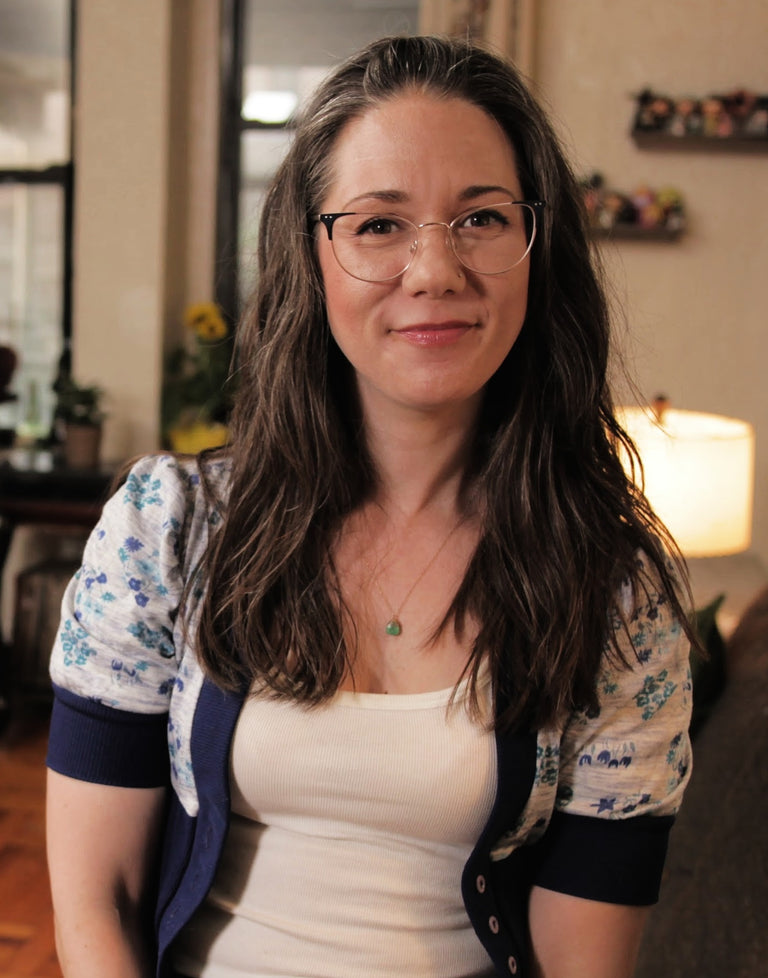If you've noticed more of your hair falling out in the shower recently, you’re not alone. Whether temporary or permanent, sudden or gradual, hair loss is a fairly common experience, and it’s only increased in recent years thanks to record-high chronic stress resulting from the COVID-19 pandemic.
But illness and associated stress are just two of many possible reasons you might be experiencing excessive hair shedding. Read on to uncover the most common types of hair loss and the causes behind them. Plus, learn what you products to add to your haircare routine to combat thinning hair.
1. Aging
Getting older is one of the most common causes of hair loss because, well, aging happens to all of us. Hormonal changes that are a normal part of aging (such as menopause) cause us to lose hair, in part because the hair follicles are not being stimulated. This can make your hair fall out at a faster rate than your follicles can grow new hairs. Additionally, new hairs that grow are often thinner due to miniaturization (or shrinkage) of the hair follicles.
“Hair gets thinner and loses volume as we age because hair follicles get senescent (old) and simply stop producing hair,” said board-certified dermatologist Dr. Kemunto Mokaya. “The follicles that produce hair make finer, thinner strands, and this contributes to hair thinning and loss of volume. Hair also grows more slowly as we age.”
While it's normal for your hair to grow more slowly with age, there's also plenty you can do to ensure your hair is as healthy as possible at any age.
Explore Products for Thinning Hair
2. Genetics (Androgenetic Alopecia)
If you've noticed a receding hairline, an increase in the size of your hair part, reduced hair volume or even thinning of the hair near your temples, it could be a sign of hereditary hair loss.
Genetics is responsible for the most common cause of hair shedding, gradual thinning and eventual hair loss: Androgenetic alopecia (AGA). AGA is also known as androgenic alopecia, male- or female-pattern hair loss and male- or female pattern baldness.
With androgenetic alopecia, your hair is genetically pre-programmed to thin out. It is defined as a thinning of an individual hair strand while the hair follicle slowly stop growing hair, eventually leading to complete loss in the affected follicles.
"In androgenetic alopecia, DHT (the active form of testosterone) causes a decrease in the growth phase of the hair, making each hair progressively thinner with each hair cycle," explains clinical dermatologist Dr. Harshal Ranglani. "Ultimately, what results is thin, fine, 'vellus' hair."
While male pattern baldness has been more thoroughly researched than female pattern baldness, but it’s estimated to affect men and women in large numbers—about 50 million men and 30 million women in the US. Age and gender play a role here as well, since symptoms of AGA tend to emerge at a younger age in men than in women. Most people with AGA will see some thinning by age 40, but men are more likely to experience it earlier, while women may experience symptoms with the onset of menopause.
#include-related-slider#
3. Autoimmune Conditions
Autoimmune conditions are often linked to hair loss and excessive shedding. There are over 80 known symptoms of autoimmune conditions, but generally speaking, the characteristic they share is a mistaken immune reaction that can negatively impact various organs or systems in the body. Some autoimmune conditions that can contribute to or cause hair loss include:
- Alopecia areata (AA): This form of sudden hair loss occurs when the immune system decides to attack follicles. Alopecia areata can be triggered by stress and causes small bald spots or bald patches on the scalp.
- Thyroid issues: Multiple forms of thyroid disease, including Hashimoto’s disease and Graves’ disease can cause thyroid problems due to hormone imbalances in the thyroid gland that can impact hair growth.
- Seborrheic dermatitis: This condition—a type of eczema that affects the sebaceous glands on the scalp—doesn’t cause hair loss directly. However, in extreme cases that result in long-term aggressive itching, scratching and inflammation, damage to follicles can occur.
- Lupus: A complicated and poorly understood autoimmune disease in which the body is attacked by its own immune system. Lupus can cause your hair to become thin and fall out, especially due to stress triggers.
Autoimmune conditions can be particularly challenging since a patient with one condition is at a higher risk of developing another. Furthermore, a wider range of autoimmune conditions have been linked to hair loss, including diabetes and rheumatoid arthritis.
More: These Autoimmune Conditions Might Cause Hair Loss
4. Certain Medications
There are medications out there whose side effects include hair loss (though medication reactions vary widely based on a patient's health and physiology—certain medications might induce hair loss in one person but not another. Even drugs that are known to cause temporary hair loss, like the hair loss condition anagen effluvium (a well-known side effect of chemotherapy), do not cause hair loss in all patients.
The good news is that in most cases, once the medication is stopped, hair growth resumes. “It’s likely the hair will grow back on its own after you stop taking the medication,” Dr. Mat Rezaei, PharmD and UpGuys founder, said.
The Whole Prescription: What Medications Cause Hair Loss?
5. Stress
Both mental and physical stress have a major impact on our hair. When the body experiences a significant stressful event, such as the loss of a loved one, a major illness like COVID-19 or long COVID, surgery or the impacts of starting a new medication, telogen effluvium (TE) can develop. (Alopecia areata, while often observed as a genetic condition, can emerge from the result of stress as well.)
Telogen effluvium is a hair loss condition that typically arises suddenly, with excessive hair loss that can be downright distressing. The good news is that it is a temporary condition that typically resolves on its own.
But when thinking about the connection between stress and hair health, it helps to expand your understanding of stress to include chronic, ongoing stress. Beyond a single stressful event, ongoing sources of stress, like a cutthroat work environment, relationship issues or even the difficulty of living day-to-day in a pandemic, can become chronic and increase cortisol levels in the body. Cortisol, the body's "stress hormone," can negatively impact follicles and hair growth when levels become chronically elevated.
As such, these less drastic forms of everyday stress, when encountered regularly and over time, can send our bodies into a constant state of stress, which can throw the hair growth cycle out of whack. Pay attention when your body tells you it's stressed and take care of yourself (and your hair) accordingly.
Shop: Dr. Neera Nathan's Top VEGAMOUR Picks
6. Hormonal Changes
Hair loss conditions like telogen effluvium might make a temporary appearance when you start or stop taking oral contraceptives (also known as birth control pills), or make other changes to your birth control routine. More gradual changes and thinning might also happen over time as hormones evolve with aging. “Hair loss can be a cause of hormonal imbalance during puberty, pregnancy, menopause, aging, or due to birth control,” said Dr. UPGUYS.
“As an OB/GYN who specializes in treating menopause, I can tell you that hair thinning is common during this stage of life,” explained Dr. Michael Green, a board-certified obstetrician-gynecologist with Winona. “That's because hormone levels dip at this time, leading to hair loss. Menopause can come on earlier than many people think, and women who face the early onset of menopause (between ages 41-45) are often surprised to discover thinning hair.”
Hormonal changes might also be tied to other medical conditions, like polycystic ovary syndrome (PCOS). With PCOS, hormones become imbalanced and affect periods, hair growth, skin and weight.
Find Out: 5 Ways Hormones Can Affect Your Hair
7. Childbirth
Speaking of hormonal changes, hair loss is often associated with sudden and drastic shifts in the body and commonly happens to women after giving birth (called postpartum hair loss), affecting about 40 to 50 percent of new moms. Postpartum hair loss most often manifests as short-term telogen effluvium, and most women will notice a drastic increase in hair shedding within three months after the baby is born. While TE can feel scary since the shedding often comes on quite suddenly, it is temporary, and patients typically return to their regular hair growth cycles within 6 to 12 months.
Hair Story: My Experience With Postpartum Hair Loss
8. Hair Care
In many cases, your hair can only be as healthy as the stuff you put in on it. Your follicles can become irritated from a number of ingredients in shampoos, conditioners and other styling products, preventing growth. Likewise, the skin on your scalp can become clogged and then get overly oily or dry and flaky as a result, leading to a situation where you're losing far more strands than you're able to grow.
To prevent your hair care routine from ironically hurting your hair, choose a shampoo and conditioner that will help unclog your scalp and support with a serum to reduce dandruff and improve moisture. Plus, invest in a scalp massager to support circulation to the head to create an environment where hair wants to grow.
Shop: GRO Revitalizing Shampoo and Conditioner
9. Hair Styling (Traction Alopecia)
You might assume that your hairstyling routines could lead to hair damage and breakage, but some are surprised to learn that hair loss can occur as well. Repeated stress on your scalp from tight hairstyles like ponytails, braids, buns, extensions or weaves can lead to a gradual thinning and possible permanent loss of hair by way of a condition called traction alopecia.
Traction alopecia is not necessarily permanent—if addressed early on, it can be reversed. Early signs include redness or bumps and hair breakage and loss near the hairline. However, if not treated, hair loss can be permanent due to scarring that damages the roots of hair.
#include-related-slider#
10. Nutritional Deficiencies
We all know that a healthy, diverse and balanced diet is essential for general health and well-being. Our follicles need that too, since they build out every single strand of hair cell by cell. As such, it's important to nourish your body and to make sure a nutritional deficiency isn't hiding in plain sight.
“Hair relies on the intake of nutrients and vitamins to stay healthy, just like any other part of the body," explained Dr. Earim Chaudry, medical doctor and founder of health company Manual. Nutritional deficiencies and poor nutrition can also contribute to hair loss and can stem from following a restricted diet.”
But even if you're not restricting your eating, nutritional deficiencies can still occur. "As a hairstylist, I see hair loss in my clients tends to ebb and flow," hairstylist Lina Waled commented. "[But] the main issues I see [in women] are low iron, [low] B12 and stress."
So make sure you’re getting hair-friendly nutrients like vitamins A, B-7 (biotin), C, D and E. Add healthy proteins, iron and zinc to the list to make sure your follicles have all they need to thrive. One easy option: Consider a supplement formulated to support hair health.
11. Diabetes and Insulin Resistance
Blood sugar levels can also impact follicles. Currently available information suggests that chronically elevated blood glucose levels might contribute to hair fragility, thinning or decreased growth speed. Some research has suggested that hair loss might even be an early indicator of prediabetes (insulin resistance preceding type 2 diabetes).
“A prolonged elevated blood sugar level can cause damage to the blood vessels around the body, restricting blood flow and depriving hair follicles of the oxygen and nutrients they need for a healthy hair growth cycle,” said Dr. Chun Tang of Pall Mall Medical.
12. Other Illnesses and Medical Conditions
Some illnesses, including COVID-19 infection, can impact your hair growth. In fact, there is a documented relationship between COVID-19 infections and cases of telogen effluvium. While more research is needed, initial evidence indicates that a COVID-19 infection can lead to telogen effluvium roughly two months after recovery from the illness. The research indicates that more women seem to lose hair after becoming infected than men.
Other serious illnesses like the flu, along with other medical conditions like high blood pressure and autoimmune disorders can also impact hair. Trichotillomania, or hair-pulling disorder, is a mental health condition that can lead to longterm hair loss.
If You're Still Worried, See A Doctor
If you suspect an underlying medical issue could be at play with your hair loss, a doctor can do a diagnostic blood test to gain an understanding of what the root of the issue could be. Doctors can also examine your scalp and individual hair shafts to gain insight into the problem. No matter what, you're better safe than sorry. Hair shedding and hair loss are complex, so if you’re noticing more shedding, it’s best to consult your primary care doctor or a dermatologist to catch issues quickly and thereby prevent further hair loss down the line.
Shop: Products for Thinning Hair
Healthy Hair, Healthy You
A holistic approach to hair health is essential for true hair wellness, and that includes self-care beyond your mane. In addition to making changes to your hair care routine, getting enough sleep, managing stress, finding ways to exercise, consuming a nutritious diet can all help your hair stay healthy.
When it comes to your hair routine, incorporate products that have been formulated to support hair health. VEGAMOUR’s GRO Hair Serum has been shown to improve the appearance of hair density and decrease visual signs of shedding.
The Takeaway
Excessive hair shedding and hair loss can be triggered or exacerbated by an array of physiological processes, medical conditions, styling techniques or hair products and even genetic predispositions. No matter what, though, the experience of losing hair can be incredibly stressful and challenging. So if you’re noticing more hair shedding, shifts in the texture or quality of your hair or any other unusual hair changes, consult your doctor to figure out a game plan. And stay caught up with the VEGAMOUR blog for the latest information on how to care for your hair.
MORE FROM VEGAMOUR:
- Why Choose GRO Hair Serum
- 6 Expert-Approved Tips to Stop Hair from Thinning
- What To Avoid if You Have Thinning Hair
- What Causes Hair Loss In Women?
Photo credit: Mathilde Langevin/Unsplash
Back



















